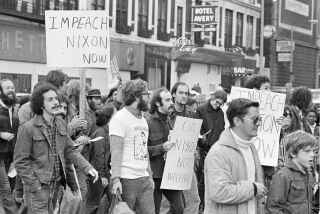NEWS ANALYSIS : In Bulgaria, Looking Back With Longing : Eastern Europe: A nation in crisis yearns for the ‘good old days’ of Communist rule.
- Share via
SOFIA, Bulgaria — More than four years into an economic free fall, Bulgaria has yet to hit the bottom.
The economy has contracted sharply in each of the years since Communist leader Todor Zhivkov was overthrown in a bloodless coup. Unemployment is 16% and rising. Inflation topped 60% last year. Foreign investment has been a pittance, and the country is $13 billion in debt.
By every political and economic measure, Bulgaria is in crisis and there is no end in sight to its troubles. Living conditions are so much worse in the reform era that Bulgarians look back fondly on communism’s “good old days,” when the hand of the state crushed personal freedom but ensured that people were housed, employed and had enough to eat.
A Western diplomat posted in Sofia predicted that if a vote were held in the next few months, Bulgarians would replay the “Poland scenario,” reelecting former Communists in a desperate attempt to reclaim the past.
The Parliament is split between the ever-so-slightly reformed Socialist Party and a 16-group coalition known as the Union of Democratic Forces. Neither group commands a majority, which has allowed the small Movement for Rights and Freedom, representing Bulgaria’s ethnic Turks, to play kingmaker, shifting support from left to right as priorities dictate and undermining governments.
The hopelessly divided Parliament has proved incapable of producing reform legislation needed to win foreign investors’ confidence. And a dispute over the need for early elections may leave the paralyzed legislature in power through the October, 1995, expiration of its current mandate, ensuring the status quo of a collapsing economy and stagnant investment.
“The general stumbling block is political instability,” Georgi Shivarov of the Bulgarian Industrial Assn. said of the lack of foreign investment, which since 1989 has totaled $260 million--less than 4% of the amount invested in Hungary over the same period.
Bulgaria’s proximity to the raging Yugoslav wars is also scaring away investors, Shivarov said.
Interim Prime Minister Lyuben Berov, a nonpartisan historian, is the fourth man to head the government since multi-party elections in 1990. He was chosen by the Socialists and the Movement for Rights and Freedom to serve as a caretaker until new elections but has already held office for 14 months while the parties bicker endlessly and veto each other’s bills.
The result has been paralysis in institutions of power, leaving Bulgaria’s 8.5 million residents to fend for themselves in a system where social security was an early victim of mismanaged reform. Crime and corruption are flourishing, as made evident by a mid-January fatal shootout between two gangs of police officers in downtown Sofia.
“It’s like Chicago in the 1920s!” bemoaned laid-off truck driver Stoyan Totev. “Maybe we had some problems under communism, but it wasn’t so dangerous as this so-called democracy.”
Polls suggest that Bulgarians are undecided about which political force holds the best prospects for their future, having seen living conditions erode under both Socialist and Union-led governments. Apathy afflicts much of the population.
“Some of the reforms have been made according to shock therapy theories, and this has created strong opposition in the population,” Socialist leader Jean Videnov said. “People are very bitter about it, and we think they are going to vote for our more balanced approach.”
More to Read
Sign up for Essential California
The most important California stories and recommendations in your inbox every morning.
You may occasionally receive promotional content from the Los Angeles Times.














